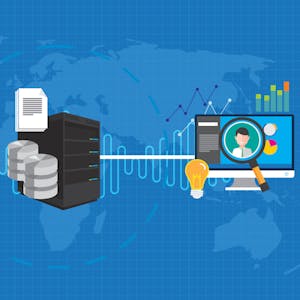Getting Started with Data Warehousing and BI Analytics
Data is one of an organization’s most valuable commodities. But how can organizations best use their data? And how does the organization determine which data is the most recent, accurate, and useful for business decision making at the highest level? After taking this course, you will be able to describe different kinds of repositories including data marts, data lakes, and data reservoirs, and explain their functions and uses.
A data warehouse is a large repository of data that has been cleaned to a consistent quality. Not all data repositories are used in the same way or require the same rigor when choosing what data to store. Data warehouses are designed to enable rapid business decision making through accurate and flexible reporting and data analysis. A data warehouse is one of the most fundamental business intelligence tools in use today, and one that successful Data Engineers must understand.
You will also be able to describe how data warehouses serve a single source of data truth for organization’s current and historical data.
Organizations create data value using analytics and business intelligence applications. Now that you have experienced the ELT process, gain hands-on analytics and business intelligence experience using IBM Cognos and its reporting, dashboard features including visualization capabilities.
Finally, you will complete a shareable final project that enables you to demonstrate the skills you acquired in each module.
Explore the architecture, features, and benefits of data warehouses, data marts, and data lakes and identify popular data warehouse system vendors.
Design and populate a data warehouse, and model and querydata using CUBE, ROLLUP, and materialized views.
Identify popular data analytics and business intelligence tools and vendors and create data visualizations using IBM Cognos Analytics.
Design and load data into a data warehouse, write aggregation queries, create materialized query tables, and create an analytics dashboard.
Syllabus
Syllabus - What you will learn from this course
Week 1
Data Warehouses, Data Marts, and Data Lakes
Week 2
Designing, Modeling and Implementing Data Warehouses
Week 3
Data Warehouse Analytics
Week 4
Final Assignment and Final Quiz
FAQ
When will I have access to the lectures and assignments?
Access to lectures and assignments depends on your type of enrollment. If you take a course in audit mode, you will be able to see most course materials for free. To access graded assignments and to earn a Certificate, you will need to purchase the Certificate experience, during or after your audit. If you don't see the audit option:
The course may not offer an audit option. You can try a Free Trial instead, or apply for Financial Aid.
The course may offer 'Full Course, No Certificate' instead. This option lets you see all course materials, submit required assessments, and get a final grade. This also means that you will not be able to purchase a Certificate experience.
What will I get if I subscribe to this Certificate?
When you enroll in the course, you get access to all of the courses in the Certificate, and you earn a certificate when you complete the work. Your electronic Certificate will be added to your Accomplishments page - from there, you can print your Certificate or add it to your LinkedIn profile. If you only want to read and view the course content, you can audit the course for free.
Reviews
